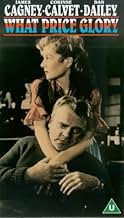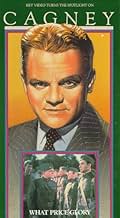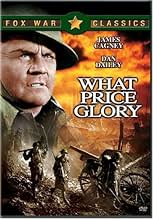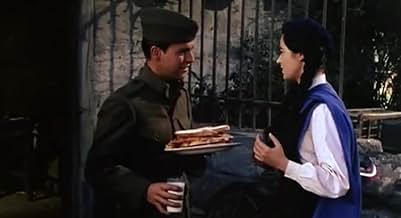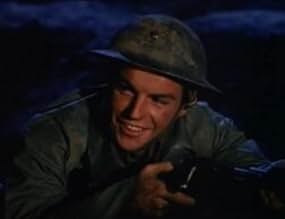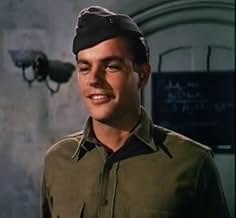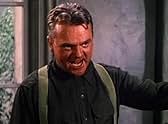PUNTUACIÓN EN IMDb
6,1/10
1,5 mil
TU PUNTUACIÓN
En la Francia de 1918, el capitán Flag tiene a su cargo una compañía de marines. Entre ellos se encuentra el nuevo sargento primero, su viejo enemigo Quirt, con quien se volverá a enfrentar ... Leer todoEn la Francia de 1918, el capitán Flag tiene a su cargo una compañía de marines. Entre ellos se encuentra el nuevo sargento primero, su viejo enemigo Quirt, con quien se volverá a enfrentar por el amor de la hija del tabernero.En la Francia de 1918, el capitán Flag tiene a su cargo una compañía de marines. Entre ellos se encuentra el nuevo sargento primero, su viejo enemigo Quirt, con quien se volverá a enfrentar por el amor de la hija del tabernero.
- Dirección
- Guión
- Reparto principal
Max Showalter
- Lt. Moore
- (as Casey Adams)
Luis Alberni
- Grand Uncle
- (sin acreditar)
Olga Andre
- Sister Clothilde
- (sin acreditar)
Tina Blagoi
- Mrs. Bouchard
- (sin acreditar)
Danny Borzage
- Gilbert
- (sin acreditar)
George Bruggeman
- German Lieutenant
- (sin acreditar)
Frederic Brunn
- German Officer
- (sin acreditar)
Paul Bryar
- Charmaine's Uncle
- (sin acreditar)
Reseñas destacadas
Ford might be best known for his Westerns, but he made nearly as many military pictures as he made Westerns (perhaps more if we were to count his cavalry pictures in the military genre). What Price Glory is a WWI picture starring James Cagney as a commanding officer. He's involved with the daughter of an innkeeper, Charmaine (Corinne Calvet), but he doesn't think he should marry her. He pushes off one of his underlings (Dan Dailey) on her, but later regrets it. There's also a nice romantic subplot involving a young Robert Wagner and a French teenager, Marisa Pavan. A lot of it works very well. I love Calvet. She's best known for her role in Anthony Mann's The Far Country, where she played the pig-tailed girl with the stocking cap who was always trying to sing for Jimmy Stewart. Oh, I know she's not a great actress, but she's so damn cute and charming. I love her character here, nice but opportunistic. The sets and cinematography are very good. The one aspect that really harms it is Dan Dailey. He gives a very weak performance and is very unsympathetic. 7/10.
Built around cynicism and a love triangle that reminds me more of lesser Wilder or maybe even lesser Hawks than lesser John Ford, What Price Glory is a bit of a mess of a film about two romantic rivals competing over the affections of one woman with the backdrop of the First World War. A remake of a 1926 silent film starring long-time Ford stalwart Victor McLaglan (who does not appear in this film), it feels like Ford tried to twist a screenplay that didn't fit his sensibilities and only got so far, ending with a final product that never feels like it settles into one kind of story to tell.
Captain Flagg (James Cagney) leads a battalion of American troops behind the trench lines near the German front, having made his headquarters in a small French town where his men frequent the café and inn owned by the father of Charmaine (Corinne Calvet) with whom Flagg is having a love affair. Into this situation comes Flagg's newest officer, First Sergeant Quirt (Dan Dailey), who is to take responsibility for the welfare and training of the new recruits as top sergeant. The problem is that Flagg and Quirt have a history back in the Philippines when Quirt stole Flagg's girl, a girl Flagg had planned on marrying. The first half of the film is a borderline light comedy about the two men reigniting their animosity (having a pair of quick and impromptu boxing matches in Flagg's office), Quirt taking advantage of Flagg's trip to Paris when he leaves Charmaine behind by courting the pretty French girl, and Flagg trying to figure out if he's going to punish Quirt by forcing Quirt to leave Charmaine or marry her. There are other events, like Private Lewisohn (Robert Wagner) falling for another French girl Nicole Bouchard (Marisa Pavan), giving us the only remnants of the original idea of making the film a musical when Nicole sings a song to Lewisohn.
Then the battalion gets called to the front, and I thought I knew where the film was going to go. I thought, this being a John Ford film, the two men, Flagg and Quirt, would bond over their mutual experiences at the front. One of them would die in action, and the other would go back to Charmaine to marry her as much out of love for the girl as out of a sense of duty to the fallen comrade. I was confident for about twenty minutes as the film gained the kind of sober seriousness movies about trench warfare in World War I generally receive.
However, that's not what I actually got. Now, I'm not lukewarm on the film because it didn't play out as I expected. I'm lukewarm on it because what actually played out is some combination of not very good and confused. There's a serious tonal issue that begins popping up that never goes away that I feel is a symptom of a deeper problem and not the problem itself. The love triangle simply ends up continuing.
Flagg has been given a mission to sneak across enemy lines and capture a German officer in order to extract information about a potential big push by the Germans supposedly coming up soon. After sending several young men to die in one effort, Flagg, desperate to go back to Charmaine and deny Quirt the wedding Flagg himself had arranged for the pair, suddenly realizing the depths of his emotions for Charmaine, takes Quirt across the lines where they almost capture a German colonel who dies in the retreat back to the American lines. Then...in front of a wounded young soldier, Lewisohn brings in a German lieutenant randomly. It's almost comedic how the German prisoner suddenly appears right after Flagg and Quirt (who's been wounded and will be going back to the rear to potentially marry Charmaine) deliver their news of their failure. And then it becomes a chase as Flagg tries to figure out a way back to the rear while Quirt gets sent to a military hospital to deal with his wounds.
The cynicism of the two as they finally confront Charmaine, who goes from a fun cinematic creation in the beginning to a frustratingly indecisive and passive character by the end, trying to decide things as they get very quickly drunk and over a single hand of five card poker, feels nothing like what John Ford would deliver. This is where I began having my thoughts about the film feeling more at home in the body of work with either Wilder or Hawks. It wouldn't suddenly be a good film if the other two had made it, but it would just more naturally fit with the films around it. Ford is usually too heartfelt to offer up something this cynical.
And that cynicism is really what bothers me because it doesn't really feel like it belongs, which is seemingly a weird thing to say about a movie about World War I. Movies about The Great War generally should be cynical because of the wanton human suffering it caused, but the hour and a half that preceded that descent into cynicism doesn't support this. The film isn't actually about the waste of human life that was the war. The same story could have been told in the setting of World War II, to be honest, and not much would have needed to change outside the setting of the battle. It's about a love triangle in the time of war, the temporal nature of life in a warzone (reminding me in particular of They Were Expendable), and...then it seems to go off the deep end. The final moments of the film try to walk back the cynicism as well, with both Flagg and Quirt deciding to say goodbye to Charmaine forever to join up with the Big Push, as though it's Ford, in the movie's closing, trying to insert that common motif of the brotherhood of arms that is the military. But it creates this real whiplash at the ending.
Cagney also feels wrong for the role of Flagg. He may actually be part of the problem with the tone of the latter parts of the film because he simply cannot calm down in a scene. He has to be the center of attention, even if the scene is quiet. Dan Dailey fares better as Quirt, though since he's often sharing scenes with Cagney he can sometimes get lost. The character of Charmaine may end up devolving a bit in the face of the two men fighting over her (I would have really liked it if she had simply walked out on both men during the poker game, but alas, she does not), but Corinne Calvet has a wonderful sense of life and sadness about her that mostly makes up for the latter changes in her character. Wagner also has a certain melancholy and innocence that the movie can't quite take advantage of.
It's also often quite nice to look at. Once again returning to use Technicolor, Ford used color well and intelligently, especially in the trenches. There's a moment where Lewisohn moves into the doorway of a shelter, infused with red-lit fog in the corner of the frame, and it's quite striking. There are also moments in No Man's Land that could be considered beautiful if not for the brutality on display.
I'm now curious to watch the original 1926 film to see if that shares some of the same problems or even ends the same way. Ford was famous for using scripts as recommendations as much as an actual guide, and it wouldn't surprise me if he had riffed a lot of the action on screen with his actors (abusing them all the way, surely) while never really addressing how what he was doing was going to affect the overall film. Its opening is too nice, and its second half is too handsome to dismiss the film out of hand. However, it's really not any kind of lost gem.
Captain Flagg (James Cagney) leads a battalion of American troops behind the trench lines near the German front, having made his headquarters in a small French town where his men frequent the café and inn owned by the father of Charmaine (Corinne Calvet) with whom Flagg is having a love affair. Into this situation comes Flagg's newest officer, First Sergeant Quirt (Dan Dailey), who is to take responsibility for the welfare and training of the new recruits as top sergeant. The problem is that Flagg and Quirt have a history back in the Philippines when Quirt stole Flagg's girl, a girl Flagg had planned on marrying. The first half of the film is a borderline light comedy about the two men reigniting their animosity (having a pair of quick and impromptu boxing matches in Flagg's office), Quirt taking advantage of Flagg's trip to Paris when he leaves Charmaine behind by courting the pretty French girl, and Flagg trying to figure out if he's going to punish Quirt by forcing Quirt to leave Charmaine or marry her. There are other events, like Private Lewisohn (Robert Wagner) falling for another French girl Nicole Bouchard (Marisa Pavan), giving us the only remnants of the original idea of making the film a musical when Nicole sings a song to Lewisohn.
Then the battalion gets called to the front, and I thought I knew where the film was going to go. I thought, this being a John Ford film, the two men, Flagg and Quirt, would bond over their mutual experiences at the front. One of them would die in action, and the other would go back to Charmaine to marry her as much out of love for the girl as out of a sense of duty to the fallen comrade. I was confident for about twenty minutes as the film gained the kind of sober seriousness movies about trench warfare in World War I generally receive.
However, that's not what I actually got. Now, I'm not lukewarm on the film because it didn't play out as I expected. I'm lukewarm on it because what actually played out is some combination of not very good and confused. There's a serious tonal issue that begins popping up that never goes away that I feel is a symptom of a deeper problem and not the problem itself. The love triangle simply ends up continuing.
Flagg has been given a mission to sneak across enemy lines and capture a German officer in order to extract information about a potential big push by the Germans supposedly coming up soon. After sending several young men to die in one effort, Flagg, desperate to go back to Charmaine and deny Quirt the wedding Flagg himself had arranged for the pair, suddenly realizing the depths of his emotions for Charmaine, takes Quirt across the lines where they almost capture a German colonel who dies in the retreat back to the American lines. Then...in front of a wounded young soldier, Lewisohn brings in a German lieutenant randomly. It's almost comedic how the German prisoner suddenly appears right after Flagg and Quirt (who's been wounded and will be going back to the rear to potentially marry Charmaine) deliver their news of their failure. And then it becomes a chase as Flagg tries to figure out a way back to the rear while Quirt gets sent to a military hospital to deal with his wounds.
The cynicism of the two as they finally confront Charmaine, who goes from a fun cinematic creation in the beginning to a frustratingly indecisive and passive character by the end, trying to decide things as they get very quickly drunk and over a single hand of five card poker, feels nothing like what John Ford would deliver. This is where I began having my thoughts about the film feeling more at home in the body of work with either Wilder or Hawks. It wouldn't suddenly be a good film if the other two had made it, but it would just more naturally fit with the films around it. Ford is usually too heartfelt to offer up something this cynical.
And that cynicism is really what bothers me because it doesn't really feel like it belongs, which is seemingly a weird thing to say about a movie about World War I. Movies about The Great War generally should be cynical because of the wanton human suffering it caused, but the hour and a half that preceded that descent into cynicism doesn't support this. The film isn't actually about the waste of human life that was the war. The same story could have been told in the setting of World War II, to be honest, and not much would have needed to change outside the setting of the battle. It's about a love triangle in the time of war, the temporal nature of life in a warzone (reminding me in particular of They Were Expendable), and...then it seems to go off the deep end. The final moments of the film try to walk back the cynicism as well, with both Flagg and Quirt deciding to say goodbye to Charmaine forever to join up with the Big Push, as though it's Ford, in the movie's closing, trying to insert that common motif of the brotherhood of arms that is the military. But it creates this real whiplash at the ending.
Cagney also feels wrong for the role of Flagg. He may actually be part of the problem with the tone of the latter parts of the film because he simply cannot calm down in a scene. He has to be the center of attention, even if the scene is quiet. Dan Dailey fares better as Quirt, though since he's often sharing scenes with Cagney he can sometimes get lost. The character of Charmaine may end up devolving a bit in the face of the two men fighting over her (I would have really liked it if she had simply walked out on both men during the poker game, but alas, she does not), but Corinne Calvet has a wonderful sense of life and sadness about her that mostly makes up for the latter changes in her character. Wagner also has a certain melancholy and innocence that the movie can't quite take advantage of.
It's also often quite nice to look at. Once again returning to use Technicolor, Ford used color well and intelligently, especially in the trenches. There's a moment where Lewisohn moves into the doorway of a shelter, infused with red-lit fog in the corner of the frame, and it's quite striking. There are also moments in No Man's Land that could be considered beautiful if not for the brutality on display.
I'm now curious to watch the original 1926 film to see if that shares some of the same problems or even ends the same way. Ford was famous for using scripts as recommendations as much as an actual guide, and it wouldn't surprise me if he had riffed a lot of the action on screen with his actors (abusing them all the way, surely) while never really addressing how what he was doing was going to affect the overall film. Its opening is too nice, and its second half is too handsome to dismiss the film out of hand. However, it's really not any kind of lost gem.
In 1918, in Bar-de-Duc, France, the leader of a company of Marines in the front, Captain Flagg (James Cagney), receives a group of green replacements and his disaffection, the tough Sergeant Quirt (Dan Dailey). Their rivalry increases when they both feel attracted by the same easy woman and daughter of the local innkeeper, Charmaine (Corinne Calvet).
What a disappointing and silly parody of war this "What Price Glory" is! Directed by John Ford and with James Cagney in the cast, I could not believe that this film would be so weak. Today I have watched "The Road to Glory", a great anti-war movie directed by Howard Hawks that shows the barbarian life in the trenches in WWI. However, John Ford has made neither a comedy (like Robert Altman's "MASH"), nor a romance or drama or war movie. Actually it is a messy feature, too silly and not funny for a comedy, too heavy for a romance and unreal for a drama or war, but with a magnificent cinematography and a lovely Corinne Calvet. My vote is five.
Title (Brazil): "Sangue por Glória" ("Blood for Glory")
What a disappointing and silly parody of war this "What Price Glory" is! Directed by John Ford and with James Cagney in the cast, I could not believe that this film would be so weak. Today I have watched "The Road to Glory", a great anti-war movie directed by Howard Hawks that shows the barbarian life in the trenches in WWI. However, John Ford has made neither a comedy (like Robert Altman's "MASH"), nor a romance or drama or war movie. Actually it is a messy feature, too silly and not funny for a comedy, too heavy for a romance and unreal for a drama or war, but with a magnificent cinematography and a lovely Corinne Calvet. My vote is five.
Title (Brazil): "Sangue por Glória" ("Blood for Glory")
Well, despite having made "The Sands of Iwo Jima", John Ford made a movie about World War I Marines that doesn't really seem to be about Marines at all. I'm not a student of World War I Marine slang, but it seemed odd for Captain Flagg to pronounce Sergeant Quirt his "Top Soldier" and for Marines to refer to each other as soldiers. Despite the fact that they under French command, I found it odd for them to refer to being in the Army, since they are in the Corps. Go figure.
The two combat scenes are amateurish, even by Ford's standards. The acting is not convincing (except when Robert Wagner dies and Cagney manages not to over-act it) and while you can believe the two main characters don't like each other at the beginning, you never believe there's some odd tie binding them together. The character development is relatively tame, with only Wagner and Harry Morgan (Colonel Potter as a Marine Corporal and quartermaster!) showing any depth among the minor Marine characters.
Dan Dailey does play a convincing loud, parade ground senior NCO. He conveys the conniving and womanizing well, but when he is supposed to have finally fallen for the French beauty, it's hard to believe. Cagney plays merely a caricature of the hard-bitten, seen-it-all Marine. His final scene neither convinces you he considers staying or that the Corps means so much to him that he has to go.
The worst part is when a wounded Marine shouts out the title of the movie. It's something along the lines of "Are you going to get in the game, Captain? There's two minutes left and we need a hero. What price glory, Captain? What price glory?" One can imagine that delivered stirringly by a character whose motivation we understand, but instead, it is shouted by a nameless face with only a crazed look. It also would help if the Captain had been portrayed as a glory hound instead of drunken, war-weary yet sympathetic. I guess they had to get the name of the movie in somehow....
I was trying to imagine John Ford's World War I and was sadly disappointed that it wasn't more moving.
The two combat scenes are amateurish, even by Ford's standards. The acting is not convincing (except when Robert Wagner dies and Cagney manages not to over-act it) and while you can believe the two main characters don't like each other at the beginning, you never believe there's some odd tie binding them together. The character development is relatively tame, with only Wagner and Harry Morgan (Colonel Potter as a Marine Corporal and quartermaster!) showing any depth among the minor Marine characters.
Dan Dailey does play a convincing loud, parade ground senior NCO. He conveys the conniving and womanizing well, but when he is supposed to have finally fallen for the French beauty, it's hard to believe. Cagney plays merely a caricature of the hard-bitten, seen-it-all Marine. His final scene neither convinces you he considers staying or that the Corps means so much to him that he has to go.
The worst part is when a wounded Marine shouts out the title of the movie. It's something along the lines of "Are you going to get in the game, Captain? There's two minutes left and we need a hero. What price glory, Captain? What price glory?" One can imagine that delivered stirringly by a character whose motivation we understand, but instead, it is shouted by a nameless face with only a crazed look. It also would help if the Captain had been portrayed as a glory hound instead of drunken, war-weary yet sympathetic. I guess they had to get the name of the movie in somehow....
I was trying to imagine John Ford's World War I and was sadly disappointed that it wasn't more moving.
Marine buddies James Cagney (as Captain Flagg) and Dan Dailey (as Sergeant Quirt) carouse through World War I, and eventually become rivals for the affections of beautifully-proportioned Frenchwoman Corinne Calvet (as Charmaine). Newly arriving from Philadelphia, handsome 22-year-old Robert Wagner (as Private Lewisohn) is attracted to local 17-year-old Marisa Pavan (as Nicole Bouchard). The pretty, dark-haired girl's father is upset. Rivaling Mr. Wagner for handsomeness, Craig Hill (as Aldrich) asks the titular question, "What price glory?" Future TV stars William Demarest and Harry Morgan support the troops...
This successful stage comedy-drama became a huge "silent" film hit for Fox in 1926, winning Quigley Publications "Best Picture" award and rising high in everyone's "Ten Best" list for the year. This 1952 re-make did not score as well with audiences...
One of the original film's "all-talking" comedy sequels was the semi-musical "The Cock-Eyed World" (1929), which is how this project was initially envisioned. We have colorful cinematic sets, a few remaining musical performances and stage-lighting techniques. Director John Ford and the Fox personnel assembled were much more aware of the earlier films, helping to explain this misfire. The story began as an anti-war statement; while present, the point gets lost in the inebriated interplay between Mr. Cagney and Mr. Dailey. The actors are forced to alternate between broad "F Troop"-style antics and the accumulation of dead bodies.
***** What Price Glory (7/25/52) John Ford ~ James Cagney, Dan Dailey, Corinne Calvet, Robert Wagner
This successful stage comedy-drama became a huge "silent" film hit for Fox in 1926, winning Quigley Publications "Best Picture" award and rising high in everyone's "Ten Best" list for the year. This 1952 re-make did not score as well with audiences...
One of the original film's "all-talking" comedy sequels was the semi-musical "The Cock-Eyed World" (1929), which is how this project was initially envisioned. We have colorful cinematic sets, a few remaining musical performances and stage-lighting techniques. Director John Ford and the Fox personnel assembled were much more aware of the earlier films, helping to explain this misfire. The story began as an anti-war statement; while present, the point gets lost in the inebriated interplay between Mr. Cagney and Mr. Dailey. The actors are forced to alternate between broad "F Troop"-style antics and the accumulation of dead bodies.
***** What Price Glory (7/25/52) John Ford ~ James Cagney, Dan Dailey, Corinne Calvet, Robert Wagner
¿Sabías que...?
- CuriosidadesJohn Ford was an uncredited second unit director in the 1926 version directed by Raoul Walsh.
- PifiasCaptain Flagg's command was referred to as L Company, 5th Marines. In WWI Marine Companies were numbered. Prior to WWI they served independently with battalions and above were ad hoc organizations. 5th Marines should 5th Regiment. The change from Regiment to Marines wouldn't come until the 30s.
- Citas
Captain Flagg: It's a lousy war, kid... but it's the only one we've got.
- ConexionesFeatured in El único juego en la ciudad (1970)
- Banda sonoraOui, Oui, Marie
(uncredited)
Music by Fred Fisher
Lyrics by Al Bryan and Joseph McCarthy
Sung by Corinne Calvet and chorus
Selecciones populares
Inicia sesión para calificar y añadir a tu lista para recibir recomendaciones personalizadas
- How long is What Price Glory?Con tecnología de Alexa
Detalles
- Fecha de lanzamiento
- País de origen
- Idiomas
- Títulos en diferentes países
- What Price Glory
- Localizaciones del rodaje
- Marine Corps Base Camp Pendleton, California, Estados Unidos(army base scenes)
- Empresa productora
- Ver más compañías en los créditos en IMDbPro
- Duración1 hora 51 minutos
- Relación de aspecto
- 1.37 : 1
Contribuir a esta página
Sugerir un cambio o añadir el contenido que falta


